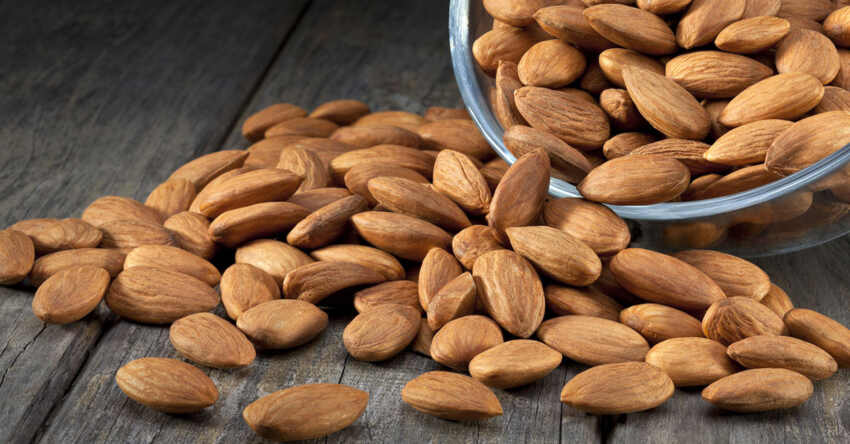Almonds for Kids – Benefits and Side Effects
- What Are Almonds?
- Nutritional Content in Almonds
- What Are the Benefits of Eating Almonds for Children?
- What Are the Possible Side Effects?
- How to Include Almonds in Your Child’s Diet
- Almond Recipes for Children
It is common for a mother to worry about her child’s health. We are sure you must be very careful about your child’s diet and must be doing everything possible to make sure that he gets his daily dose of nutrition. Almonds are a must for children as they are loaded with essential nutrients that a child needs in his growing years. Find out how almonds can benefit your child.
What Are Almonds?
Almonds are known as the ‘king of nuts’ and are a healthy snack. They contain vitamins, minerals, and unsaturated fats. There are basically two types of almonds.
1. Sweet Almonds
These are the almonds famous for their health benefits and are widely consumed almost everywhere around the world.
2. Bitter Almonds
These are also known as ‘wild almonds’. These almonds are used for cooking, and it has so many other medicinal advantages. Many people do avoid this type of almond because of the presence of amygdalin.
Nutritional Content in Almonds
Almonds are an amazing health food as they are high in protein, vitamins, and minerals. Almonds have almost zero cholesterol, which can prevent coronary cardiac diseases. Almonds act as an antioxidant that is soluble in lipids. Almonds contain many vitamins and minerals which may prove to be effective for the growth and development of kids. Here are some of the highlighted nutrients present in 23 grams of almonds.
| Nutrient | Amount |
| Protein | 4.88g |
| Carbohydrates | 4.98g |
| Fat | 11.37g |
| Calories | 132 |
| Dietary Fibre | 2.81g |
| Phosphorous | 0.11132g |
| Vitamin E | 0.00603g |
| Vitamin B2 | 0.00023g |
What Are the Benefits of Eating Almonds for Children?
Almonds can be very beneficial for the health of your child. Find out how!
1. Boosts Immune System
Immune strength plays a key role in deciding the health of a child. If you want to strengthen the immune system of your child, make sure you give him almonds as the alkali metals present in almonds can strengthen their Immunity. The presence of antioxidants in almonds can also lower the risk of diseases in your child. As almonds are rich in Vitamin E, eating them can also prevent the risk of coronary heart disease.
2. Strengthens the Bones
Minerals like calcium and phosphorus can strengthen the bones of your child. Almonds have a high content of phosphorus; including them in your child’s diet will ensure that he has strong teeth and bones. Your child will also be protected from the chances of tooth decay and osteoporosis in his later years.
3. Promotes Healthy Brain Development
L-Carnitine and riboflavin present in almonds will ensure brain development. These nutrients can also prevent Alzheimer’s disease. Almonds can also help improve the memory power and concentration of your children. Include almonds in your child’s diet – he will become smart and active.
4. Boosts Energy Level
Almonds have a high content of copper, riboflavin, and manganese. These are needed to maintain a proper rate of metabolism and to provide energy. Include almonds in your child’s diet if he tends to be restless all the time.

5. May Help Prevent Cancer
As almonds are rich in fiber, consuming them will help boost the passage of food through the colon. This can decrease the chances of getting colon cancer.
6. May Cure Skin Problems
If your child has skin problems like dry skin, consider giving him almonds. Most of the doctors suggest almond oil for babies as it helps in the development of bones and can make the skin healthy.
7. Treats Constipation
The high fibre content in almonds can provide relief from constipation. Almonds are rich in fatty acids, linolenic fatty acids, and linoleum, which can help in lowering the inflammation.
8. Maintains Blood Pressure
Potassium and sodium content are quite high in the almonds, which can help prevent blood pressure fluctuations.
Nuts are no doubt healthy for children but sometimes they may trigger allergies too. Nuts should be given to babies once they turn six months of age. You should avoid giving almonds to your baby if you notice any allergic reaction or have a family history with people allergic to nuts. Mentioned below are some possible side effects of eating almonds.
- Consuming a few bitter almonds might be deadly for an individual.
- Some people might be allergic to almonds. This will result in them having rashes on their skin and might have serious problems with breathing.
How to Include Almonds in Your Child’s Diet
Almonds are very tasty and are loaded with many nutrients. Almonds can be given to eat directly, or you could add them to different food preparations. In the market, you will be able to find almonds in many forms like almond syrup, almond butter, and almond milk. You could also get raw almonds in varieties like blanched, salted, shelled, or un-shelled. If your child is too small and cannot eat it as a whole, then you can soak it in water for a while or even powder it which can be added to the milk. This will give a nice flavor to the milk and your child will love it.
If your child likes cereals, then you can add 1-2 teaspoons of almond butter to his bowl of oatmeal or rice to make it healthier and tastier. You could make a dip by taking equal parts of light cream cheese and almond butter and add some milk to it. This can be served along with sliced bananas or any other fresh fruits.
Almond Recipes for Children
Here are some really simple recipes you could try at home for your children.
1. Almond Milk
Almond milk tastes delicious and we are sure your child will enjoy. Here is how you can make almond milk.

Ingredients
- Almonds – 1 cup
- Water – 1 litre
How to Prepare
- Soak the almonds in a bowl of water. Keep the bowl in a refrigerator for about four hours. You can soak the almonds overnight too.
- Next, remove the outer skin of the almonds. You could skip this step if you had bought blanched almonds.
- Along with some fresh water, blend the almonds in a blender or a food processor.
- Through a metal strainer, press this mixture either using a hard spoon or a spatula to get the smooth almond milk.
- You can now give your children this homemade almond milk.
2. Almond Cookies
Almond cookies are loved by all, and these would make a great snack.

Ingredients
- Almond meal – 1/2 cup
- Plain flour – 2/3 cup
- Corn flour – 2 tbsp
- Powdered sugar – 1/3 cup
- Salt to taste
- Baking powder – 1/2 tsp
- Butter – 1/3 cup
How to Prepare
- Sift the plain flour, corn flour, salt, and baking powder in a large bowl. Keep the bowl aside.
- Beat the butter and sugar using a blender and do this until it turns fluffy. Put the almond meal in the mixture of sifted flour and try to make a very soft dough.
- Wrap this soft dough in a plastic paper and keep it in the refrigerator for a few minutes.
- After some time, take the dough from the refrigerator and roll it in a thickness of ½ inches.
- To obtain perfect shapes, you could use a cookie cutter, and you could also place an almond on the surface of every cookie.
- Bake these cookies at 170° Celsius in the oven for about 20-22 minutes.
All the benefits of almonds are enough to make sure that your children’s diet has almonds in them. However, it is better to check with a doctor first before giving almonds to your baby. Like everything else, almond should also be eaten in a limit since excess consumption could trigger other side effects. Giving your children two or three almonds every day is ideal so that they get the necessary benefits of these nutritious nuts.
SHIJINA RIJESH
